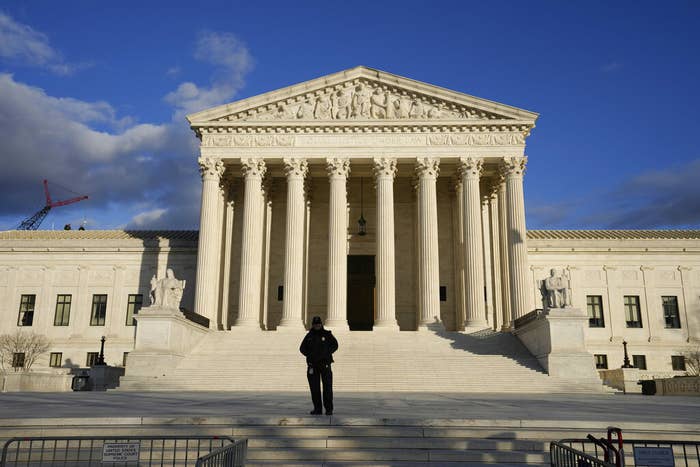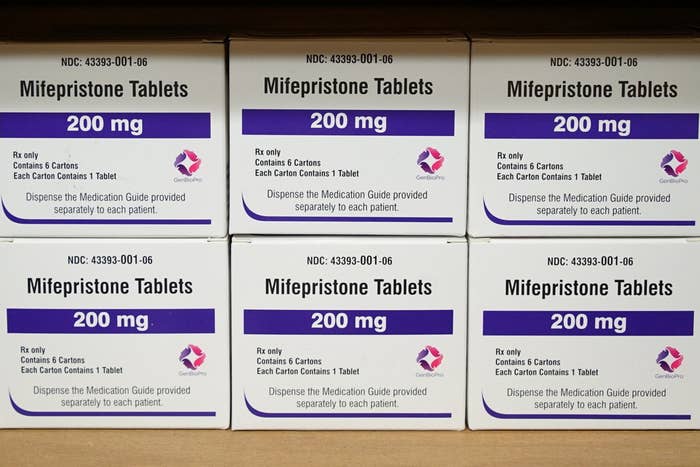
The Supreme Court has briefly extended emergency action to pause stringent restrictions on the abortion medication mifepristone from taking effect. The pause, originally intended to apply through the end of Wednesday, April 19, was extended through midnight on Friday, April 21.
The Supreme Court’s original order staying the restrictions, released last week on Friday, April 14, and signed by Justice Samuel Alito, stated that the temporary hold would last through Wednesday, April 19, 2023, and gave the litigants until Tuesday at noon ET to submit responses.
This decision put on hold lower court rulings that would have restricted access to the abortion medication mifepristone. The order from the Supreme Court preserved the status quo (for now) of previous regulation while litigation over the issue continues. The Justice Department, along with drug manufacturer Danco Laboratories, had filed emergency requests on Friday, April 14, asking the Supreme Court for the stay.
Mifepristone is currently used, along with misoprostol, as part of the most common two-drug regimen for medication abortions and is often referred to as the “abortion pill.” Medication abortions, according to a 2022 survey from the Guttmacher Institute, are the most common method of abortion administered each year in the United States. Since the Supreme Court overturned Roe v. Wade last year, 13 states have banned most abortions while two states have passed six-week abortion bans, making access to abortion medication extremely crucial in those states. Under existing regulations, mifepristone has been permitted to be dispensed by mail and could be administered up to 10 weeks into a pregnancy.

On April 12, a federal appeals court ruling walked back many changes the FDA had made over the last several years which made it easier for patients to access and even self-manage medical abortion, particularly in areas where it may be difficult to access in-person care. The ruling from the 5th Circuit Court of Appeals said that though mifepristone could remain available to the American public, there would be new restrictions, such as: prohibiting the medication from being sent to patients by mail, prohibiting it from being prescribed without an in-person visit with a physician, and reducing the period of pregnancy when the drug can be taken to seven weeks.
The restrictions on mifepristone were set to take effect on Saturday, April 15.
The April 12 ruling stemmed from an appeal to a ruling a few days prior in which a conservative federal judge in Texas suspended the FDA’s approval of mifepristone, which had first been authorized in 2000. The Trump-appointed judge, Matthew Kacsmaryk, said that regulators had failed to consider "the psychological effects of the drug or an evaluation of the long-term medical consequences of the drug.” The three-judge appeals court panel in the April 12 ruling blocked the part of Kacsmaryk’s ruling that suspended the approval but sided with him on restrictions regarding access to the drug.
Mifepristone is widely considered safe by medical experts. In the Texas case, the American College of Obstetricians and Gynecologists, American Medical Association, Society for Maternal-Fetal Medicine, and nine other medical organizations submitted a brief that stated there was “overwhelming evidence demonstrating that mifepristone — which has undergone rigorous testing and review and has been safely used in the United States for 23 years — is conclusively safe and effective.”
The Texas case was brought by the Alliance for Hippocratic Medicine, an anti-abortion group that aimed to force the FDA to withdraw its approval of the drug.
In the Department of Justice’s brief from April 14, it asked the Supreme Court to allow mifepristone to remain available while the government pursues an appeal and criticized the decisions from the lower federal court to restrict the drug, calling the potential impact of the decision “profoundly damaging.”
“The district court countermanded a scientific judgment FDA has maintained across five administrations; nullified the approval of a drug that has been safely used by millions of Americans over more than two decades; and upset reliance interests in a healthcare system that depends on the availability of mifepristone as an alternative to surgical abortion for women who choose to lawfully terminate their early pregnancies,” the DOJ brief reads.
The restrictions on mifepristone, though from a federal court, would not have immediately impacted every state across the US, as on Thursday, a federal judge in Washington state ruled in a competing decision that the FDA cannot limit access to the drug in 17 states and the District of Columbia. The states include Arizona, Colorado, Connecticut, Delaware, Michigan, Nevada, Pennsylvania, Washington, Vermont, and more. The competing rulings introduced legal confusion that led many experts to conclude the issue would end up at the Supreme Court before long.
But despite many states not being affected by the ruling, drug manufacturer Danco Laboratories said in its brief to the Supreme Court that if the ruling restricting access to the drug is allowed to stay, it could effectively be a national, if temporary, ban, that would impact the company’s business. The company claimed that it would be difficult for it to keep distributing mifepristone until the labels and packaging are revised, it recertifies providers and amends contracts, and gets new FDA approval, which, it said, “typically takes months.”
“In the face of this uncertainty, Danco may well be forced to halt operations,” the company states.
Providers have also been clear that in the event of a temporary or permanent removal of mifepristone, a misoprostol-only regimen would remain available for abortion care. “Prior to the approval of mifepristone, a regimen that only uses misoprostol was used and has been shown to be safe and effective,” Melissa Myo, an OB-GYN in California and a fellow of the advocacy group Physicians for Reproductive Health, previously told BuzzFeed News. “Misoprostol-only regimens are used worldwide in places that do not have mifepristone.” Misoprostol is safe to use on its own, but it tends to cause more side effects, such as nausea, and the drug on its own is not always as fully effective as taking mifepristone and misoprostol together.
Supporters of abortion rights celebrated the April 14 temporary order while calling for more permanent protection for medication abortion. NARAL Pro-Choice America President Mini Timmaraju said in a statement, “While medication abortion remains legal for now, this case should never have been heard in the first place."
Meanwhile, the director of the ACLU Reproductive Freedom Project, Jennifer Dalven, said in a statement to BuzzFeed News that the ACLU was "pleased that the court took the only sensible action here which was to hit pause on a profoundly dangerous decision that has been widely criticized as unprecedented and wholly unprincipled by experts across the ideological spectrum."
Dalven added that the order was just the "first step," and that now the courts "must put an end to this baseless case."
